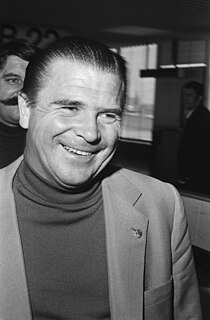
Ferenc Puskás was a Hungarian footballer and manager, widely regarded as one of the greatest players of all time and he is the son of former footballer Ferenc Puskás Senior. A prolific forward, he scored 84 goals in 85 international matches for Hungary, and 514 goals in 529 matches in the Hungarian and Spanish leagues. He became an Olympic champion in 1952 and led his nation to the final of the 1954 World Cup where he was named the tournament's best player. He won three European Cups, 10 national championships and 8 top individual scoring honors. In 1995, he was recognized as the top scorer of the 20th century by the IFFHS.
Lukács is a Hungarian surname, derived from the given name Lukács, which is the Hungarian equivalent of Lucas. Alternative spellings and derivative forms in neighboring languages include Lukacs, Lukáč, Lukač, Lukach, Lucaci and Lukačić. The surname may refer to:
Schmidt is a common German occupational surname derived from the German word "Schmied" meaning "blacksmith" and/or "metalworker". This surname is the German equivalent of "Smith" in the English-speaking world.
Kovačić, alternatively spelled Kovačič in Slovene, Kovacsics in Hungarian, or transliterated as Kovacic/Kovacich/Kovachich in English, is one of the most common surnames in Croatia, Slovenia, as well as Hungary and Serbia. Etymologically it is a patronymic derivative of the surname Kovač, which is a Slavic cognate of the English surname Smith, and as such is closely related to the similar surname Kovačević.

Horvat is the most frequent surname in Croatia and Slovakia, 2nd most frequent in Slovenia and 5th most frequent surname in Hungary. The surname originates in Croatia, Horvat being the older version of the word Hrvat, an autonym used by Croats. In Croatia, majority of Croats with surname Horvat live in the Kajkavian dialect region in Croatia proper. According to the 2011 census, it's the most common last name in the city of Zagreb, Zagreb County Krapina-Zagorje County, Varaždin County, Koprivnica-Križevci County, Bjelovar-Bilogora County, Virovitica-Podravina County and Virovitica-Podravina County. Apart from them, there is a certain number of ethnic Serbs with surname Horvat inside Baranja region of Croatia. Almost half of the citizens of Slovenia that have the surname Horvat live in the Prekmurje region, where it is the most common surname by far. It is also common in Lower Styria and in Ljubljana, while it is very rare in western Slovenia.

Krisztián Vadócz is a Hungarian professional footballer who plays as a central midfielder for Hong Kong Premier League club Kitchee.
Edward Souza-Neto was an American soccer player who earned at least 7 caps and scored 2 goals for the United States men's national soccer team, and played in the U.S. team's historic 1–0 victory over England in the 1950 FIFA World Cup. Souza was also a member of the U.S. team for the 1948 Summer Olympics. He played his club soccer with Fall River Ponta Delgada and New York German-Hungarian SC.
Feher, or more properly Fehér, is a surname of Hungarian origin, meaning white. Bearers of the name include the following:

Vera T. Sós is a Hungarian mathematician, specializing in number theory and combinatorics. She was a student and close collaborator of both Paul Erdős and Alfréd Rényi. She also collaborated frequently with her husband Pál Turán, the analyst, number theorist, and combinatorist. Until 1987, she worked at the Department of Analysis at the Eötvös Loránd University, Budapest. Since then, she has been employed by the Alfréd Rényi Institute of Mathematics. She was elected a corresponding member (1985), member (1990) of the Hungarian Academy of Sciences. In 1997, Sós was awarded the Széchenyi Prize.
Oláh or Olah is a Hungarian language surname, which means "Romanian", derived from the word volách, and from that vlach, meaning "Italian" or "speaker of a Romance language".
Vuković is a common family name found in Bosnia and Herzegovina, Croatia, Montenegro, and Serbia, of which bearers are either Bosniaks, Croats, Montenegrins or Serbs, as well as medieval families long before idea of national identity ever appeared.
István Bognár is a Hungarian football (midfielder) player who currently plays for Nemzeti Bajnokság I club MTK. He mostly feared by the deadly passes which he gives to his teammates. He’s nickname is The Assist King.
Varga or Vargha is a Hungarian language occupational surname derived from the Hungarian term "Varga" which means "leatherworker" or leather repairman; someone who works with leather. As such, varga also used to refer to saddle makers, shoemakers or boot makers.
Ildikó Zirighné Sós is a Hungarian female water polo player. She was a member of the Hungary women's national water polo team, playing as a goalkeeper.
Csiszár or Csiszar is a Hungarian surname. It may refer to:
Lashgari is a Persian surname. Notable people with the surname include:
Bozsik is a Hungarian surname. It may refer to:
Masný or Masny is a Czech–Slovak (Masný/Masná) or Polish (Masny/Masna) surname. It is derived either from Czech maso or Slovak mäso for "meat" or from Old Polish masny, maśny with the meaning "meat-", "meaty", all originating from Proto-Slavic *męso ("meat").
People with this name include:
Marzo is an Italian and Spanish surname. Marzo in both languages means March and the name originally indicated a special connection of its bearer to the third month of the year. Besides Spain and Italy its area of distribution includes most of the Spanish-speaking world and all countries with a considerable Italian diaspora.
Notable people with this name include:
Bence Sós is a Hungarian football player who currently plays for MOL Vidi FC.





